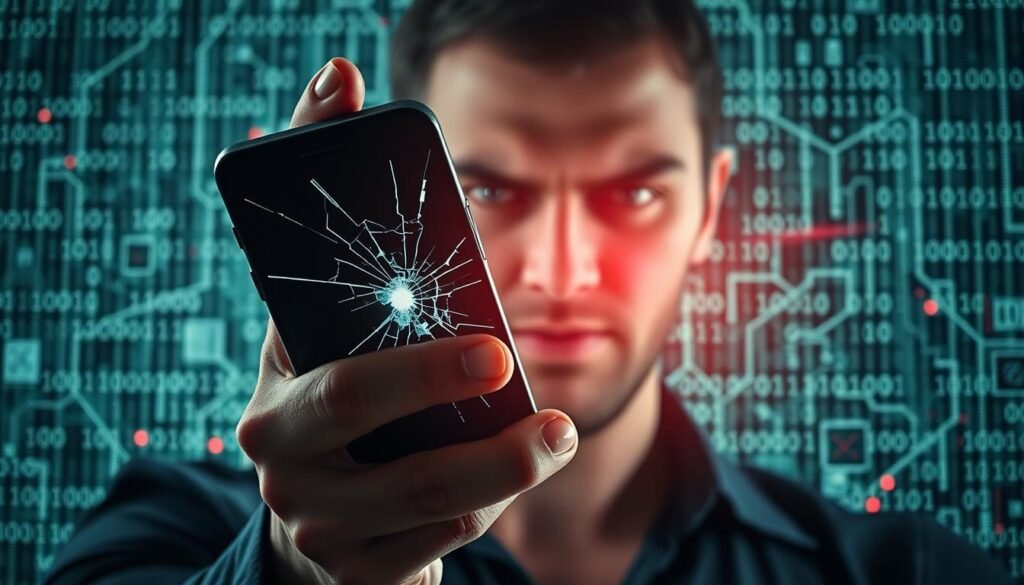Ever thought your phone acting slow or weird alerts mean it’s hacked? Nowadays, our lives mix with our phones a lot. So, keeping our phones safe is super important. Knowing the signs of a hack can save you from big troubles. This includes losing money or personal stuff. We wrote this guide to help you spot and stop hacks fast.
Key Takeaways:
- Performance issues could be an indicator of phone hacking signs.
- Unusual data usage might point to mobile security threats.
- Strange pop-ups and notifications could mean your phone is compromised.
- Unfamiliar apps may need deeper investigation to detect phone hacking.
- Early detection of these symptoms can prevent significant losses.
Introduction: The Importance of Phone Security
Phones are more than just for calls and texts now. They hold our personal data, work talks, and bank details. That’s why having strong mobile device security is crucial. With more cybersecurity threats, it’s vital to protect personal information.
Our phones have private chats and financial info. This makes them a target for bad guys online. Our lives are on our phones, so we must protect them from dangers.
We must grasp how important mobile device security is. This helps us guard against evolving cybersecurity threats. It’s not just keeping secrets. It’s making sure our precious details are safe from digital risks.
Common Signs Your Phone Might Be Hacked
Knowing how to spot when your phone is hacked is key to keeping it safe. Signs of mobile malware and spyware can show up in different ways. It’s important to recognize these signs to protect ourselves and our groups.
Performance Issues
Is your phone slow or crashing apps more than usual? That could mean malware is messing with it. Malicious software takes up resources, making your device slow.
Unusual Data Usage
A sudden jump in mobile data can mean your phone might be hacked. It could be spyware sending data to other places without you knowing.
Strange Pop-ups and Notifications
Seeing weird pop-ups or notifications you didn’t before? This could be adware. Adware pops up unwanted ads, ruining your experience and possibly risking more.
Unfamiliar Apps
Finding apps on your phone you didn’t download? That’s a huge warning. These could be harmful, sneaking in through phishing to steal your info.
| Sign | Potential Cause |
|---|---|
| Slow Performance | Mobile Malware |
| Increased Data Usage | Spyware Indicators |
| Strange Pop-ups | Adware |
| Unfamiliar Apps | Phishing Attack |
How to Know Whether Your Phone is Hacked
It’s very important to notice if your phone has been hacked early. Watching how your device acts can help a lot. This helps stop a small problem from becoming a big security issue. We need to keep an eye out for signs that your phone is at risk.
Seeing apps you didn’t install is a warning. These might just be the start of bigger problems. Look out for your battery draining fast. It could mean harmful apps are running without you knowing.
Notice if your phone is slow. This could mean something bad is using your phone’s power.
Watching how much data you use is key. If your data use goes up and you didn’t cause it, that’s a sign. Things like strange account actions or weird messages should make you wary right away.
Here’s a quick way to check if your phone has been hacked:
- Monitor unexpected app installations
- Assess peculiar battery drainage
- Pay attention to overall phone performance
- Track and analyze data usage patterns
Steps to Take if Your Phone is Hacked
Finding out your phone is hacked can be scary. But acting fast can help you get back in control. Here’s what you need to do:
Remove Suspicious Apps
The first move is to delete apps you don’t recognize. These bad apps can lead to more problems. Check your apps and remove those you didn’t download on purpose.

Change Your Passwords
After cleaning up apps, change all your passwords. This includes emails, social media, and bank apps. Use strong, new passwords for each to keep your phone safe.
Contact Your Financial Institutions
Lastly, tell your bank and others about the hack. They will watch your accounts for strange activity. This helps keep your money safe while fixing your phone.
Preventing Future Hacks
To stay safe from cyber threats, it’s vital to have good mobile security habits. These habits keep your phone safe and help you be safe online too. Here’s how to protect yourself from future attacks:
Keep Your Software Updated
Updating your device often strengthens its defense. It’s key to put in the newest security updates quickly. These updates fix weak spots that hackers could use to get into your phone. So, updating your software helps prevent phone hacking.
Avoid Public Wi-Fi and Unsecured Charging Stations
Public Wi-Fi can be risky because it’s often not secure. When doing important online tasks, avoid using public Wi-Fi. Also, stations for charging that aren’t secure can be dangerous. They might put harmful software on your phone. Using your own charger or a battery pack is safer and keeps your phone secure.
Download Apps from Trusted Sources Only
Make sure to get apps only from places you trust, like the Apple App Store or Google Play. Stay away from other app stores because they might not check apps well. Always check an app before you download it to make sure it’s safe. This helps stop phone hacking and protects your info.
Special Considerations for iPhone Users
iPhones are usually secure, but they do face their own problems. We’re experts in keeping these devices safe. Let’s look at some important areas to protect.
Malware and Viruses
Apple’s iOS is pretty tough on security, but it’s not perfect. Sometimes, bad software can sneak in. If your iPhone acts weird, like losing battery fast or showing strange apps, pay attention.

Keeping your iPhone’s software up to date helps a lot. This fixes security holes. And, only downloading apps from the Apple App Store is safer. That’s because Apple checks these apps carefully.
Jailbreaking Risks
Jailbreaking might seem cool for more app choices, but it’s risky. It can make your iPhone less safe from bad software and hackers.
Jailbreaking your iPhone can make it vulnerable. It’s not worth it for just a few extra apps. Apps from outside Apple’s store can sneak past security, which is dangerous.
To sum it up, keeping your iPhone secure while using it to the fullest is important. Knowing about malware and jailbreaking risks helps you stay safe.
Special Considerations for Android Users
Android users face special challenges compared to those with iOS devices. The freedom of Android means you can change a lot. But, it also means there’s a higher chance of running into bad apps. Knowing what dangers exist and how to stop them is key to keeping your phone safe.
Higher Risk from Malicious Apps
The Android world is open, making it easy for bad apps to get in. These apps look safe but can actually steal your info. Being careful and alert helps protect against malicious apps that target your phone.
The Role of Antivirus Software
Antivirus software is very important for Android security. It looks for and stops threats, keeping your phone safe. Using a good antivirus for Android is essential. It protects you from online dangers and keeps your phone working well.
Conclusion
Keeping your phone safe is a continuous task in today’s tech world. We need to spot signs when our phone may be at risk. This includes slowing down or seeing apps we did not download. Taking quick steps to fix problems helps us protect our phones.
It’s important to remove any apps that look strange and change our passwords often. This helps us take back control of our devices.
We must also work to stop future attacks on our phones. Updating our software and staying off unsafe Wi-Fi networks are key. Always download apps from places we trust to keep our phones safe. This keeps our personal and work info secure.
No matter if we use an iPhone or Android, knowing our phone’s risks helps. Adopting a complete security plan is vital. It gives us peace of mind and keeps our digital world safe. Being always on guard and following these tips, we strengthen our defense against hackers.
FAQ
What are common signs that my phone might be hacked?
If your phone is acting slow or apps crash, it could be hacked. You might see odd data usage and weird pop-ups. Unfamiliar apps on your device are another hint.
How can I identify performance issues as potential hacking signs?
A slow phone or crashing apps can mean malicious software is at work. Watch out for constant lagging.
What should I do if I notice unusual data usage on my phone?
A jump in data use could mean unknown apps are running. Look at your data stats and remove strange apps.
How can strange pop-ups and notifications indicate a compromised phone?
Odd pop-ups or alerts often mean adware has infected your phone. It’s a sign hackers might have targeted you.
Why are unfamiliar apps installed on my phone a sign of hacking?
If you see apps you didn’t download, it could be a phishing attack. Regularly check your apps and delete any you don’t recognize.
How can I confirm if my phone is hacked?
Keep an eye out for weird behaviors like strange apps appearing. Also, look for unusual battery drain or account activity.
What are the immediate steps to take if my phone is hacked?
Delete any strange apps right away. Change your passwords and call your bank to protect your accounts.
How do software updates help in preventing phone hacks?
Updating your software puts in new security fixes. This helps keep hackers away from your phone.
Why should I avoid public Wi-Fi and unsecured charging stations?
Public Wi-Fi and sketchy charging spots can let hackers in. Stay away from them to keep your device safe.
Why is it important to download apps from trusted sources?
Getting apps from safe places like official stores helps avoid harmful software. It keeps your phone secure.
What specific security concerns should iPhone users be aware of?
iPhone fans should watch out for malware, especially if they jailbreak their device. Breaking the security opens doors to malware.
How does jailbreaking affect iPhone security?
Jailbreaking an iPhone takes away vital security, leaving it open to malware and risks.
What risks do Android users face in terms of malicious apps?
Android’s open setup lets you do more but raises the risk of bad apps. Picking apps wisely is key.
What is the role of antivirus software for Android users?
Antivirus for Android hunts and stops threats early, adding a security layer to fight off vulnerabilities.



